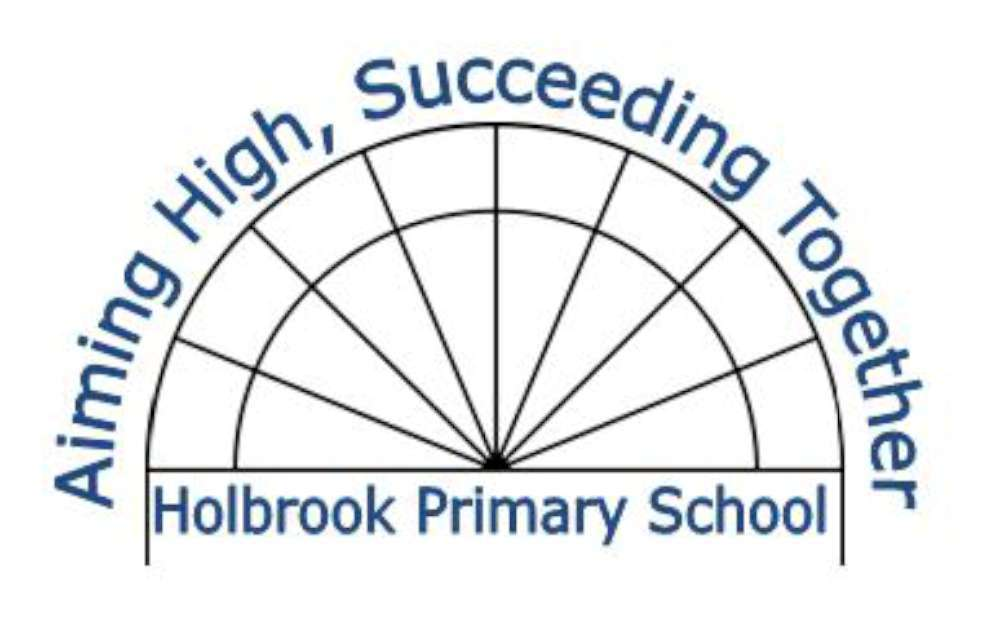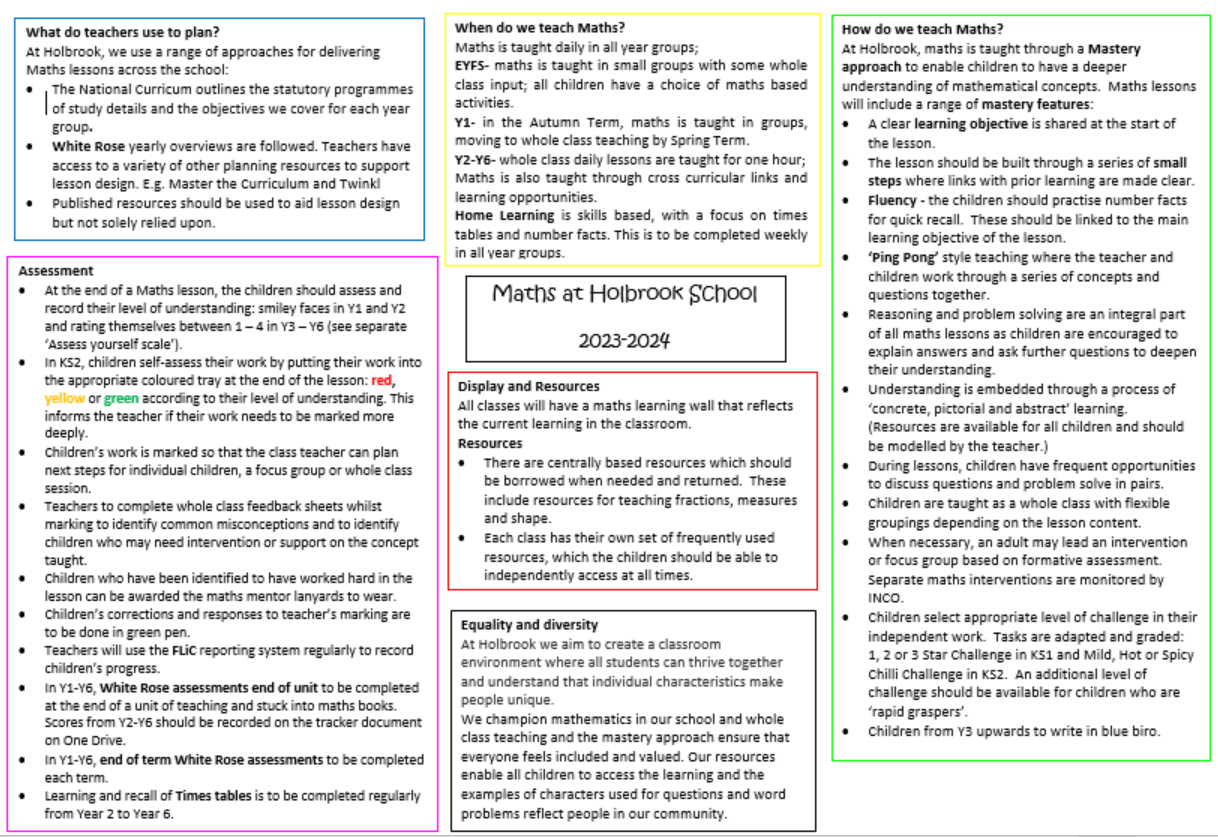Maths
Maths at Holbrook
Mathematics Curriculum Intent
At Holbrook Primary School, we want our children to be resilient mathematicians, who enjoy the curiosity and discovery that mathematics brings. Mathematics teaches us how to make sense of the world and our aim is for all children to leave Holbrook being independent, responsible and successful life-long learners. Our children are given opportunities to make connections to other subjects and everyday life regularly to support this understanding. Our mathematics mastery curriculum has been developed to ensure that every child can achieve in mathematics through practical, real life, relevant experiences. We want our children to master maths. This means our children acquire and achieve a deep, long-term, secure and adaptable understanding of the subject. The school’s maths curriculum ensures carefully sequenced knowledge, concepts and procedures to build mathematical knowledge and skills for each child. A concrete, pictorial, abstract approach provides children with a clear structure in which they can develop their depth of understanding of mathematical concepts.
We aim for all pupils to:
- become fluent in the fundamentals of mathematics so that they develop conceptual understanding and the ability to recall and apply knowledge rapidly and accurately.
- be able to solve problems by applying their mathematics to a variety of problems with increasing sophistication, including in unfamiliar contexts and to model real-life scenarios.
- reason mathematically by following a line of enquiry and develop and present a justification, argument or proof using mathematical language.
- have an appreciation of number and number operations, which enables mental calculations and written procedures to be performed efficiently, fluently and accurately to be successful in mathematics.
Curriculum Implementation
Our curriculum is frequently reviewed to ensure that is it current and effective and teachers are supported and aided in their teaching of mathematics through appropriate high quality CPD ensuring confidence in the skills and knowledge that they are required to teach. We continually strive to build upon the excellent understanding of the expectations of the curriculum that our staff have. Good practice is always shared between staff and all CPD is used to inform teaching and learning across the school. Resources and equipment are audited regularly so that children have materials of high quality and accuracy to support their learning. Our resources allow us to better use models and images to support learning in each area and enable the progression from concrete to pictorial to abstract. Children are familiar with these resources and can access them independently where needed.
Each year group follows the objectives outlined in the National Curriculum. Our curriculum is scheme assisted and the White Rose Maths is used to support teachers in planning and delivering lessons that meet the year group objectives within the National Curriculum and to ensure that all content is covered by the end of the academic year. Alongside the White Rose materials, we use many other resources, such as Master the Curriculum, Primary Stars, NCTEM, NRich. This ensures the curriculum is rich and varied and allows the children to be exposed to a variety of different fluency, problem solving and reasoning questions in different formats. Within lessons children will have access to concrete resources in order to help them embed and understand new knowledge. Children will have access to concrete resources before moving onto pictorial representations and abstract problems. Children
have access to a range of different variations to support children achieving a deep understanding of a taught concept. Within White Rose Maths, children are exposed to elements of fluency, reasoning and problem solving as the lessons are designed around these three mathematical elements. Regardless of ability, all children have access to fluency, reasoning and problem solving as well as opportunities to show greater depth of understanding for example through the use of questioning appropriate to the ability of the child. Current vocabulary will be visible on learning walls and used regularly within mathematics lessons. Children are encouraged to explain their thinking and use `because` to demonstrate their understanding. From the EYFS children are encouraged to talk and wonder about mathematics. Within the curriculum, there are opportunities planned to revisit previously learned knowledge, concepts and procedures. These retrieval activities can take the form of ‘Can you Still?’ and flashback 4 tasks. The variety of retrieval and recall activities throughout the school day ensures that, once learned, mathematical knowledge becomes deeply embedded in pupils’ memories.
Feedback is given in a variety of ways to ensure children are informed about their progress. Teachers use whole class feedback in the next lesson to address any misconceptions. Individual children that need further support or challenge are identified so any children can be quickly be identified and support put in place. To aid teacher assessment we use the White Rose end of unit assessments to identify any misconceptions and inform future planning.
In EYFS the `Statutory Framework for the Early Years Foundation Stage` and the non-statutory guidance of `Development Matters’ provides the long term planning in EYFS. To support further with their planning teachers have access to the White Rose Maths Early Years resources to support teachers with their lesson planning and provision available.
Within Year 3 and Year 4 multiplication facts are taught regularly to encourage children to be able to learn and recall multiplication and related division facts confidently. All children have access to Times Table Rockstars and other websites to continually practise their multiplication and division facts.
Within the EYFS and KS1, children have access to Numbots to practise and learn their number facts. Within Year 2 children will begin to transition from using Numbots and moving on to focusing on multiplication and division facts on Times Table Rockstars.
Both Numbots and Times Table Rockstars can be accessed both at school and home.
Curriculum Impact
At Holbrook Primary School our pupils achieve well, are highly confident in maths and we strive for them to:
- Be happy learners who talk enthusiastically about their learning and are eager to further their progress in maths.
- Have a positive approach to maths and develop a growth mindset.
- Become fluent, competent and efficient mathematicians.
- Have the ability to retrieve and recall facts and procedures, including the recollection of times tables.

